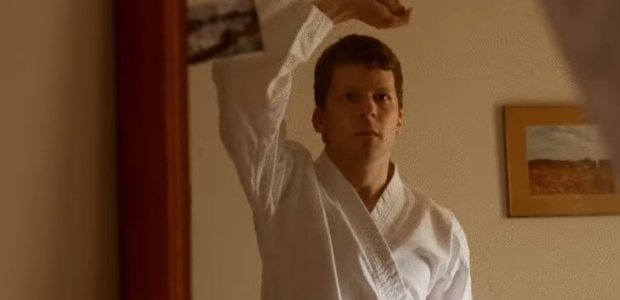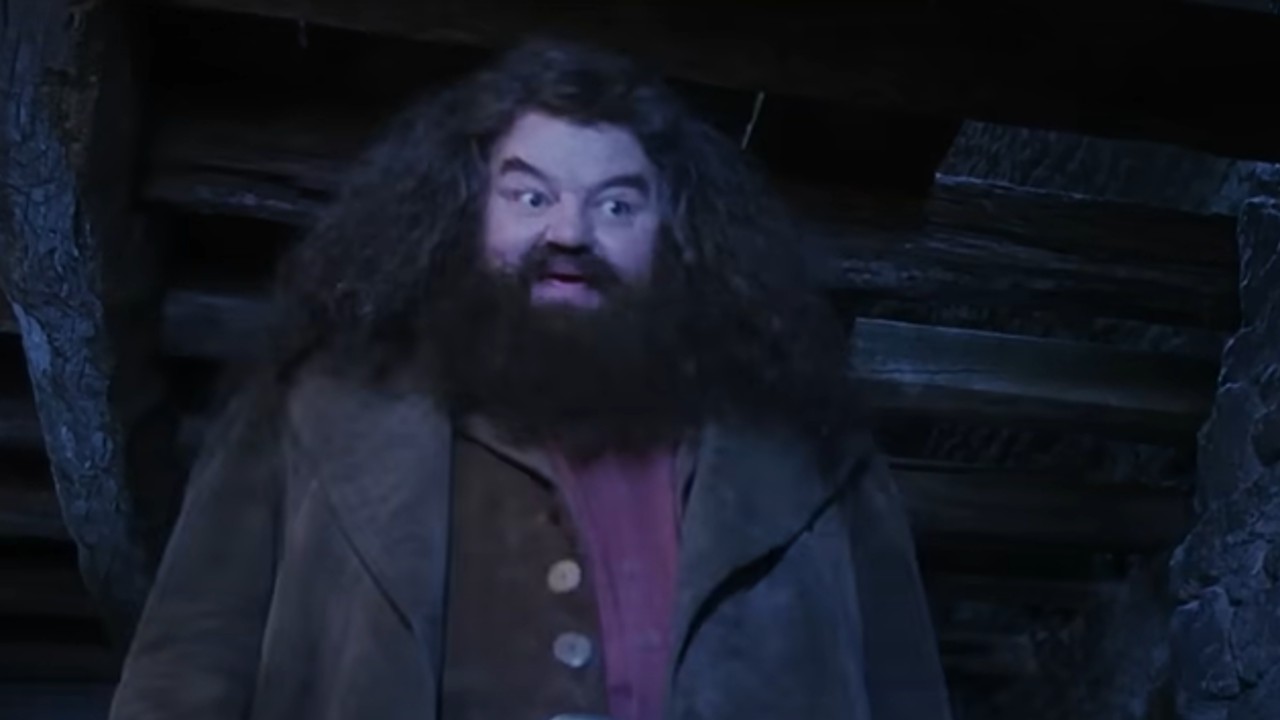It may be a tired metaphor, but there is a legitimate adjective-heavy comparison to be made between comedy and coffee, in that we all have our individual tastes and ideal preparations. Some prefer things light and sweet; while others are more into the black and bitter (see what I mean about adjectives?). Where any single person rests in this spectrum will determine their level of appreciation for any single serving – particularly if one’s tastes are well-defined.
This in mind, if you’re the kind of person who gets an extra special spring in your step courtesy of a mug of Italian Roast minus the milk or sugar, you need to run and see Riley Stearns’ The Art Of Self-Defense.
The film is the second feature from the writer/director after 2014’s smart, gripping, and claustrophobic Faults – and while this is a notably different beast, particularly in tone and scale, in that way it serves to further show the breadth of his talent. It’s a movie that wears its influences on its sleeve, with splashes of Yorgos Lanthimos and Jody Hill in the mix, but it brings them together in such a way to evolve as its own thing. Those with properly tuned sensibilities will not only get on its wavelength quickly, but will find themselves hungry for breath between laughing fits.
The Art Of Self-Defense starts with a modestly familiar high-concept premise – a young man, in this case named Casey (Jesse Eisenberg), gets violently assaulted while out running an errand one night, and in his recovery turns to karate to regain his confidence – but Riley Stearns morphs it into its own weird and wonderful narrative that is as prescient and clever as it is hilarious. Everything may look familiar, but this is a story that proudly lives in its own world. It takes on zeitgeist themes like toxic masculinity and the representation of strength in society, but it does so with its own rules that define emotional communication and sometimes even physics, often with guffaw-inducing results.
Similar to Yorgos Lanthimos (particularly in the vein of Dogtooth and The Lobster), there is a brilliant minimalist aesthetic that extends to not the physical style of the movie, but also to the way that relationships exist between characters. This is world where beige dominates, and conversations are frank and direct. It’s because of this approach that when it needs to pop and surprise, it pops and surprises incredibly well. In some ways it’s more subtle – such as the way that the vividly colored karate belts stand out against the white and brown palette as a reflection of their importance to Casey – but sometimes it’s more extreme – such as stoic conversation quickly making way for bone-splintering violence.
There is definitely an intensity factor, as The Art Of Self-Defense has some real in-the-moment shocks, but it’s when blended with smart timing and contrasts that it finds the funny, and the unique big picture tone emerges from there.
In case it’s not clear, that big picture tone is “pitch-black comedy,” and it’s the general depiction of humanity and expressed philosophy that the film invites comparison to movies like Jody Hill’s The Foot Fist Way and Observe And Report. The fact that everything is humorously heightened makes it a comedy, but there is also an acknowledgement that existence is harsh and terrible, and sometimes all you can do is laugh in the face of both true-life horror and existential dread.
It’s not a straight story about heroes and villains, because everyone is simply human and fighting for their place in this dark and insane life – be it Eisenberg’s Casey, an impish accountant who grows obsessed with life in the world of karate; Imogen Poots' karate teacher Anna, whose experiences with sexism in the dojo have served to make her resolve iron-clad; or Alessandro Nivola's demagogue-esque Sensei, who goes to extreme lengths to stifle weakness in his students. What ultimately makes people different is the code by which they live and how they personally define right and wrong. Dramatically what you’re left with is deeply flawed characters executing their particular vision of justice, and in the context of The Art Of Self-Defense it’s immensely entertaining.
It’s a movie where the performances are vital, as the actors have to sell a particular naturalism in Riley Stearns’ alternate reality, and it’s really the aforementioned three that perfectly actualize the material. Jesse Eisenberg is definitely in his wheelhouse playing the introverted Casey, but the script also allows him to come out of his shell a bit more than normal with some startling and enjoyable results. Imogen Poots is surprisingly scary as April, as the character’s passion for karate has led to her building a three-foot-thick emotional wall around herself, but there’s a lot of humor to be wrung out of that ultra-serious personality.
Alessandro Nivola, meanwhile, is the secret weapon, as Sensei is practically a cartoon in his overt representation of masculine tropes, but he spins it all with the essence of a charismatic cult leader that both grounds him and makes him more dangerous. You’re wary of him because of the ideals he represents and strives for, but simultaneously understand why Casey is enthralled by him.
Yorgos Lanthimos-meets-Jody Hill is one way to look at it. Another is Fight Club via Wes Anderson. There are a lot of comparisons to make, but nothing completely fits, as The Art Of Self-Defense is delightfully and hilariously its own thing. It’s a sharp and cutting funny movie that particularly delivers in an age of mostly toothless studio comedies, and one of the best films of the year so far.

Eric Eisenberg is the Assistant Managing Editor at CinemaBlend. After graduating Boston University and earning a bachelor’s degree in journalism, he took a part-time job as a staff writer for CinemaBlend, and after six months was offered the opportunity to move to Los Angeles and take on a newly created West Coast Editor position. Over a decade later, he's continuing to advance his interests and expertise. In addition to conducting filmmaker interviews and contributing to the news and feature content of the site, Eric also oversees the Movie Reviews section, writes the the weekend box office report (published Sundays), and is the site's resident Stephen King expert. He has two King-related columns.











